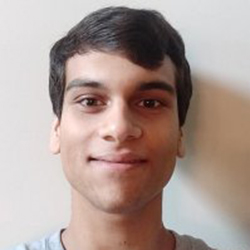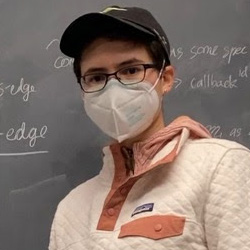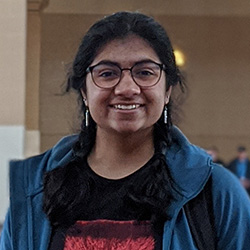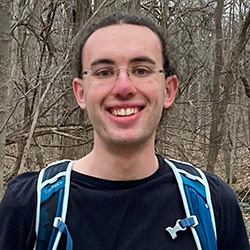Exploring New Directions and Solving Problems
On April 12, Northwestern CS hosted part two of the inaugural Undergraduate Research Showcase
Northwestern Engineering’s Samir Khuller welcomed the presenters and guests of part two of the Undergraduate Research Showcase by discussing the importance of academic curiosity.
“Knowledge is not a fixed thing contained in big books. It’s being generated all the time thanks to research, to exploring new directions and solving problems,” said Khuller, the Peter and Adrienne Barris Chair of Computer Science at the McCormick School of Engineering. “We discover more innovative ways of doing things from curious minds who start questioning and say, ‘I think I can do something better.’”
On April 12, Northwestern CS invited four distinguished undergraduate students to present their research contributions to new knowledge. Sara Owsley Sood, Chookaszian Family Teaching Professor of Computer Science and associate chair for undergraduate education at Northwestern CS, organized the virtual event, which was a continuation of inaugural Undergraduate Research Showcase on January 18.
 Amil Dravid
Amil Dravid
Amil Dravid, a third-year student in computer science at Northwestern Engineering also pursuing a minor in statistics at Northwestern’s Weinberg College of Arts and Sciences, presented “Visual Explanations for Medical Classifiers through a Generative Latent Space.” The work was performed in collaboration with adviser Aggelos Katsaggelos, Joseph Cummings Professor of Electrical and Computer Engineering and (by courtesy) computer science; Oliver Cossairt, associate professor of computer science and of electrical and computer engineering; Florian Schiffers, PhD student in computer science; and Boqing Gong, a research scientist at Google.
Aiming to understand what a deep learning model learned, Dravid and his team developed a novel generative adversarial network (GAN) framework to visually explain what a medical image-based classifier focuses on in its binary predictions. The method — called medXGAN —produces fine-grained visualizations that outperform popular baselines in disease feature localization and explanatory ability.
The work is based on two papers Dravid first-authored. The paper “Visual Explanations for Convolutional Neural Networks via Latent Traversal of Generative Adversarial Networks” was included in the 2022 AAAI Conference on Artificial Intelligence student abstract track. The other paper “medXGAN: Visual Explanations for Medical Classifiers through a Generative Latent Space” was accepted at the 2022 IEEE/CVF Conference on Computer Vision and Pattern Recognition workshops this summer.
Dravid is planning further research to generate and optimize higher fidelity image reconstructions that scale up to higher resolution images.
“With this new method I’m working on, we can get almost perfect reconstruction,” Dravid said.
Dravid was awarded the 2021 Barry Goldwater Scholarship, an honor that funds students who intend to pursue research careers in the natural sciences, mathematics and engineering.
 Caspar Popova
Caspar Popova
Caspar Popova, a third-year undergraduate student in computer science and research assistant in the CS Programming Languages group at Northwestern Engineering, is working on a project with PhD student Lukas Lazarek and Christos Dimoulas, assistant professor of computer science at Northwestern Engineering, to evaluate the usefulness of error-reporting features like blame in mixed typed languages such as TypeScript and Typed Racket. Blame is a specialized form of error information that detects the source of the buggy value in the program.
In the presentation “A Case Study in Goal-driven Benchmark Synthesis: Debugging Mixed-typed Programs with Blame,” Popova discussed how he is leveraging program synthesis techniques to design a new benchmark suite of programs. Popova’s program generator, which targets programs with varying degrees of complex, higher-order interactions between program modules, will be used to synthesize debugging scenarios to challenge the theoretical superiority of Typed Racket and the value of blame. His future work involves targeting program specifications with particular patterns of higher-order interactions by encoding these patterns in solver constraints.
Popova won a Fletcher Prize for Rising Undergraduate Research Star through Northwestern’s Office of Undergraduate Research in summer 2021.
 Vaidehi Srinivas
Vaidehi Srinivas
Vaidehi Srinivas, a first-year PhD student in theoretical computer science at Northwestern Engineering, presented “Memory Bounds for the Experts Problem,” a project that grew out of research she began as an undergraduate student at Carnegie Mellon University. The work will be featured as an accepted paper at the 54th Annual Association for Computing Machinery Symposium on Theory of Computing this summer. Srinivas analyzed a fundamental problem of sequential prediction — called the complexity of the prediction with expert advice — through the big-data lens of low-memory data streaming.
Srinivas demonstrated the problem using a game scenario of weather prediction by four experts and discussed how the classical algorithm multiplicative weights, or weighted majority of predictions, is not optimized for low-memory settings. The algorithm is evaluated based on the concept of regret, or how many more mistakes does the prediction algorithm make than the best expert in the set.
“The multiplicative weights algorithm is keeping track of the number of mistakes that every expert makes over time. This works great when your expert set is small,” Srinivas said. “Our big question is: Can we solve this problem with less memory if we are willing to compromise on regret?”
Srinivas and her team developed an algorithm model with an upper and lower bound for random and arbitrary order streams. She proposed running multiplicative weights on a randomly sampled subset of experts with an established threshold of acceptable error weight.
 Nathan White
Nathan White
Nathan White, a fourth-year undergraduate student in computer science at Northwestern Engineering, began a summer 2021 research project with the CS Theory Group focused on fair public infrastructure and designing fair networks. He presented “Hop-constraints in Steiner Tree Problems,” a project in collaboration with Konstantin Makarychev, professor of computer science.
White proposed a scenario in which Chicago plans to build a high-speed rail network to connect suburbs by retrofitting existing train lines. He modeled the question of how to minimize costs in graph theory as a Steiner Tree problem but noted that the standard Steiner Tree approach does not consider the number of stops (or “hops”) each suburb has between it and downtown Chicago. This may lead to vastly different travel times from suburb to suburb. The hop distance affects commuters’ experiences along the lines, and thus also the fairness of a proposed transit system. White’s research focuses on designing algorithms for variants of Steiner Tree with hop constraints.
